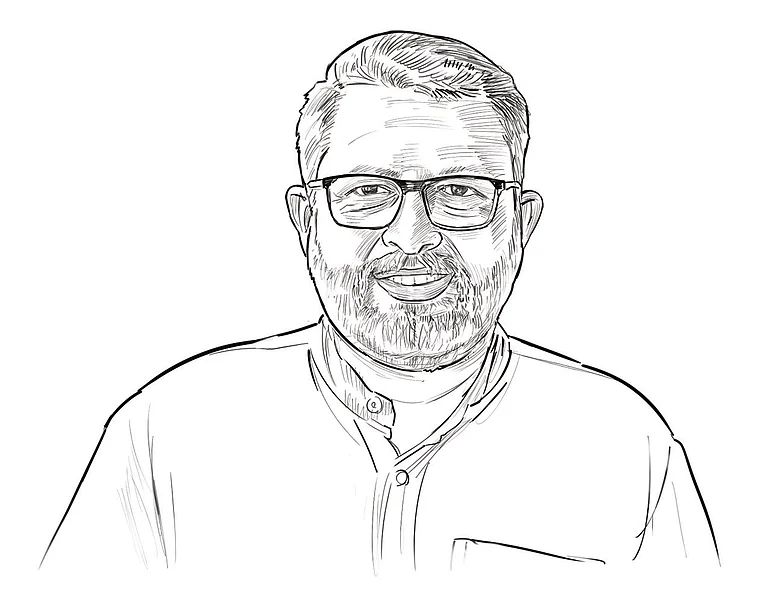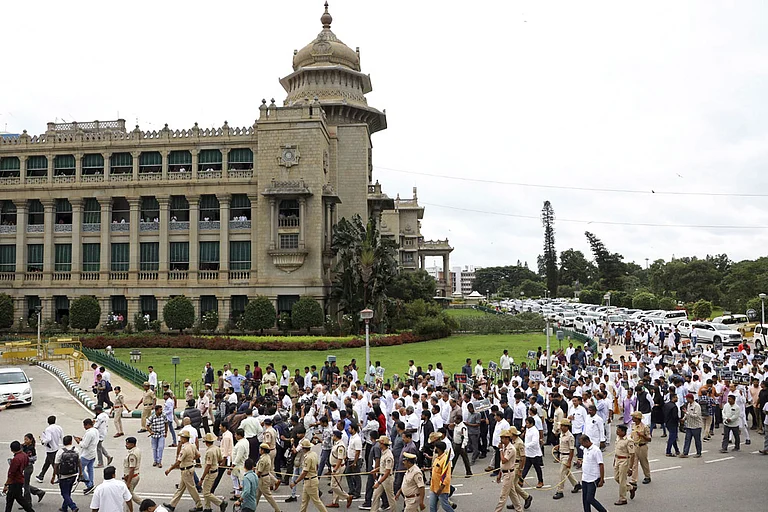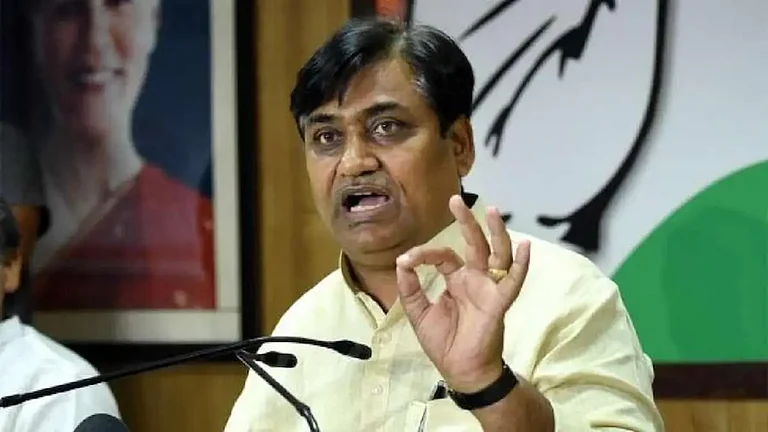The town hall in Mangalore is home to many fights. When Mazood and Faisal were murdered allegedly by those associated with the Vishwa Hindu Parishad (VHP) in Surathkal, over 26 Masjid Committees arrived to demand justice. When the previous BJP government banned hijab in educational institutions, hundreds of women gave the rallying cry ‘hijab is our right’ near town hall. Today, the call was given by INDIA bloc parties, by farmers, feminists organisations and by the people. It was a call to save coastal Karnataka.
The nearly 320 km-long (199 miles) lush coastal belt of Karnataka has for long been given the notorious distinction of being southern India’s “Hindutva laboratory”. The region is surrounded by beaches, palm trees and rich cultural heritage – everything that could make a place the ideal one to live in. But the region remains communally sensitive: 84 instances of communal discord occurred in Karnataka’s coastal districts last year, with the major contributor being hate speech in 44 cases, according to a report by People’s Union for Civil Liberties - Karnataka (PUCL-K). So much so that reports of communal violence do not shock locals in the area. Some don’t even reach the media’s radar. This is not a new phenomenon: the coastal belt of the state has been home to such clashes since the Ramjanmabhoomi movement in the 1980s and even before that.
But at the ‘People’s Convention’ in Mangalore Town Hall on Monday, the discussion wasn’t about the past. It was about changing the future. "No jobs, no better quality healthcare…only corruption. Is this a democracy? Is this the Ram Rajya we aspire to live in?” asked Muneer Katipalla, State Secretary of DYFI/CPI-M. Surprisingly, the JD(S) refused to be in the alliance for the Dakshina Kannada seat although the party is an ally of the BJP for Lok Sabha elections. The leader of JDS, Nazeer Ullal, was present on the stage as Katipalla’s words reverberated through the crowd.
The saffron party lost power in the state last year, which many thought would close BJP’s gateway to the south. But the party has continued to retain power in the coastal regions of the state — be it during the Lok Sabha elections or the state assembly elections — for almost 33 years now. Everyone remembers the figure of ‘33’ years, says Katipalla, but people should also remember that the party’s accomplishments in development and welfare have remained dubious.
Prime Minister Narendra Modi arrived for a roadshow in Mangalore on Sunday. He was accompanied by BJP’s candidate for Dakshina Kannada constituency this time – Brijesh Chowta. Both leaders were welcomed by a sea of saffron flags, supporters donning ‘Abki Baar 400 Paar’, ‘Modi Hai To Mumkin Hai’ and similar kinds of slogans on T-shirts. When the Prime Minister arrived, people showered him with flowers that were distributed by local BJP workers. Clearly, the image of Modi as PM has been leveraged by the party, with previous results also showing that the strategy worked. But neither the Prime Minister nor the BJP candidate uttered a single word.
Stating some examples of the same, Katipalla and CPI leader B Shekhar recalled how the Mangalore Airport was allegedly privatised to benefit Adani with “little progress evident”. The Airport Authority Employees Union (AAEU) alleged in 2021 that the amount that the Adani Group paid for the airports assets as per the final agreement is far less than what the Airports Authority of India’s bidding document states. “We must pledge not to vote for individuals who prioritise corporate interests over the welfare of our nation,” Shekhar said.
The BJP on the other hand, boasts of the party’s achievements: abrogation of Article 370, bringing a law against triple talaq, reservation for women, construction of the Ram Temple, to name a few. PM Modi himself mentioned these examples during a rally in Mysuru this week, saying that, “NDA does what it says.”
However, those who were present at the convention, including not just local INDIA bloc leaders but students, teachers, activists – the average citizen, asked when larger issues like employment would be addressed. One college-going student arrived with his friend at the town hall. “I only see that the party is prioritising Hindutva, caste and an emotional narrative to manipulate people into voting for them,” he says. He is worried about his job prospects in the future if BJP will continue to remain in power at the Centre. “This time I will back the INDIA bloc,” he declares.
The state goes for polls in two phases: South Karnataka on April 26 and North Karnataka on May 7. Katipalla warned that if the BJP-led NDA alliance were to return to power at the Centre, then it would lead to the toppling of the Congress government in Karnataka. Recalling ‘Operation Kamala’, the CPIM leader claimed that if BJP were to come to power in the state by toppling Congress, the party would halt all guarantees implemented by the latter.
As for the saffron party, it has dropped its Hindutva firebrand MP Nalin Kateel from Dakshina Kannada constituency. Is this a strategy to move away from polarising tactics, especially when it hit a saturation point in other parts of the state? Or will the region continue to be a hotbed for communal politics? Only time will tell as campaigning heats up in the region.



























